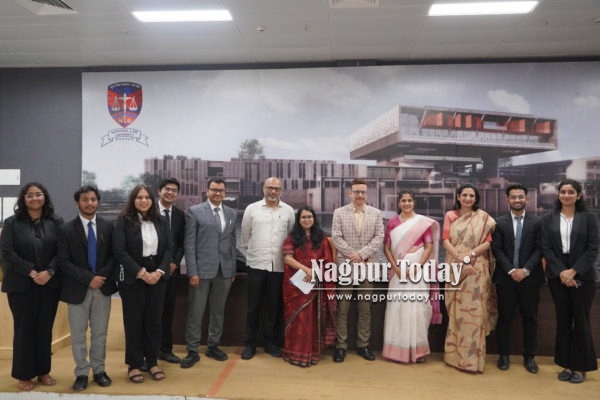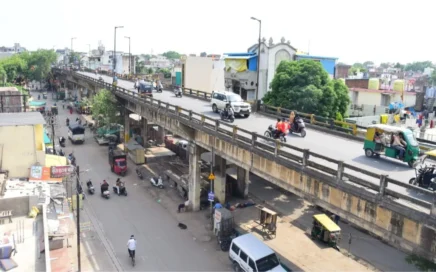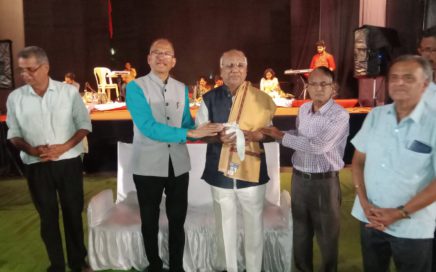
On 5th April 2025, Maharashtra National Law University, Nagpur successfully organized a one-day National Seminar on the theme “From Legislation to Practice: Evaluating the Implementation of New Criminal Laws.” The event witnessed the participation of renowned legal experts, members of the Bar and Bench, law enforcement officers, and legal scholars from across the country.
The seminar served as a powerful platform for dialogue on the effective implementation of the three landmark legislations enacted by the Government of India to redefine the Indian criminal justice system—Bharatiya Nyaya Sanhita (BNS), Bharatiya Nagarik Suraksha Sanhita (BNSS), and Bharatiya Sakshya Adhiniyam (BSA).
Inaugural Session
The inaugural session began with a welcome address by Hon’ble Vice-Chancellor Prof. (Dr.) Vijender Kumar, who emphasized the need to transition from a colonial criminal law framework to a justice system rooted in constitutional values. In his address, he stated:
“These three new criminal codes are not merely legislative reforms, but a historic attempt to harmonize procedural and substantive aspects of law with the rights-based framework of the Indian Constitution. However, the real challenge lies in ensuring these reforms translate meaningfully into practice.”
Prof. (Dr.) Kumar also highlighted the importance of focusing on practical implementation rather than just enacting laws. He pointed out significant inconsistencies in the BNS, such as the lack of clarity between general and special laws—especially concerning Section 17 of the Hindu Marriage Act and the IPC provisions on bigamy. Citing a real-life example, he drew attention to legal complications around posthumous births. He urged that criminal law restructuring must align with India’s social realities and encouraged students to analyze these changes with a practical and inclusive approach.
He further called upon the academic community not just to study legislation but to propose solutions to practical challenges in enforcement and interpretation.
Keynote Address
Prof. (Dr.) Srikrishna Deva Rao, Vice-Chancellor of NALSAR University, elaborated on the historical evolution of Indian criminal laws based on his rich academic experience. He noted that earlier amendments were often reactionary, whereas the new legislations signal a more comprehensive and decolonized approach.
He welcomed reforms such as gender-neutral language, acceptance of community service as a form of punishment, and the incorporation of technology, calling them essential for upholding constitutional morality. He also noted the involvement of private players in judicial digitization and pointed out drafting flaws. Prof. Rao encouraged students to adopt a critical perspective on these legislations.
Chief Guest Address
Hon’ble Chief Guest and Former Supreme Court Judge, Justice (Retd.) V. S. Sirpurkar shared his extensive legal experience and recalled his pivotal role in establishing the National Law University in Nagpur, referring to the city as the “navel of India.” Drawing from the Ramayana, he emphasized the importance of moral foundations:
“The moment one accepts a breach of ethical norms as permissible, one begins to deviate from the righteous path.”
Justice Sirpurkar formally inaugurated the seminar, underscoring honesty and diligence as the cornerstones of the legal profession.
Release of Contemporary Law Review
The latest issue of Contemporary Law Review was released on the occasion in the esteemed presence of Justice V. S. Sirpurkar, Prof. (Dr.) Srikrishna Deva Rao, Prof. (Dr.) Vijender Kumar, and Registrar Dr. Vivek Ghavane. Editorial board members Prof. Trisha Mittal, Dr. Neetu Kumari, Dr. Sushant Waghmare, and Dr. Divita Kothekar were also present on stage.
Plenary Session 1: Evaluating the Implementation of BNSS, 2023
This session focused on the implementation of Bharatiya Nagarik Suraksha Sanhita (BNSS), 2023, featuring speakers including Senior Advocate P. V. Dinesh, Advocate Nipun Saxena, and Mr. Harsh A. Poddar, Superintendent of Police, Nagpur Rural.
Advocate P. V. Dinesh delivered a sharp critique of the BNSS, questioning whether the reform was meaningful or merely a renaming exercise. He remarked:
“Changing the name doesn’t change the law; it’s the substance that matters.”
He raised constitutional concerns regarding Section 531 (Repeal and Savings), particularly its retrospective application, which may violate Articles 20 and 21. He flagged issues with Section 187, which allows jurisdiction-less magistrates to grant remand, potentially leading to “forum shopping” and arbitrary detention. He also criticized the dual requirement of pre- and post-cognizance notices in private complaints as unnecessary delays.
“These new laws are merely a repackaged colonial structure—old wine in a new bottle.”
SP Harsh A. Poddar highlighted practical challenges from the enforcement perspective, including e-FIRs, forensic inclusion, and remand timelines. He discussed issues like the limited availability of e-signatures, lack of clarity in preliminary investigations, and the need for differential procedures based on criminal history. While advocating for mandatory forensic investigation in serious cases, he pointed out the inadequacy of India’s current forensic infrastructure. He praised Maharashtra’s efforts in forming investigation committees for sexual offences but stressed the need for stronger police capabilities and judicial oversight.
Advocate Nipun Saxena provided a detailed critique of procedural changes in the BNSS. He flagged technical flaws in e-evidence apps, the lack of forensic support, and delays in medical reports as major hurdles. He expressed concern over the return of discretion in preliminary inquiries—pre-Lalita Kumari—potentially violating Article 14. He warned of misuse of provisions like Section 69 (false promise of marriage) due to the absence of clear evidentiary standards.
“The BNSS has become Disneyland for defense counsel — procedural loopholes and vagueness are weakening the justice system.”
Plenary Session 2: Impact of BNS, 2023 and BSA, 2023
Advocate Nandita Rao offered a thoughtful analysis of the Bharatiya Nyaya Sanhita, with a focus on sedition, sexual autonomy, and drafting quality. She strongly opposed the resurrection of the colonial sedition law from IPC Section 124A into BNS Section 152, criticizing vague terms like “subversive activity,” which could criminalize dissent, satire, or protest.
While appreciating the shift from “government” to “state,” she questioned the need for sedition laws when laws like UAPA already exist. She also noted the grave oversight in ignoring male victims by repealing IPC Section 377. On Section 69, she pointed out contradictions between false promises of marriage and the legal definition of rape, highlighting the intrusion of Victorian morality into the law.
“We must differentiate between crime and exploitation — sexual autonomy should be recognized as a constitutional right.”
Advocate Renuka Sirpurkar highlighted practical implementation concerns, noting that although BNS, BNSS, and BSA have new names, their structures still appear colonial. She emphasized the lack of awareness among lower judiciary and police, causing confusion during implementation.
Mr. Lohit Matani, DCP, Nagpur City, praised innovations like digital evidence and zero FIRs from the law enforcement perspective. However, he expressed concern about the misuse potential of vague provisions like Section 69. He emphasized the need for clear SOPs and capacity building, especially in mob lynching cases.
Vote of Thanks and Conclusion
Dr. Vivek Ghavane, Registrar of the University, delivered the vote of thanks, expressing gratitude to all dignitaries and speakers for their valuable contributions. The seminar was coordinated by Dr. Trisha Mittal, Prof. (Dr.) Shilpa Jain, and Dr. Divita Kothekar. Student conveners Naman Sharma, Tanya Bansal, Anisha Pandey, Smriti Sharma, Ayush Tripathi, and Meenal Maheshwari played a key role in executing the event.
This seminar not only served as a robust academic platform but also marked a significant initiative in offering research-backed, policy-oriented suggestions and practical feedback for the judicial system.
In conclusion, the seminar became a confluence where legislation met life—where the real value of laws was examined through the lens of practicality, constitutional ideals, and social reality.
















